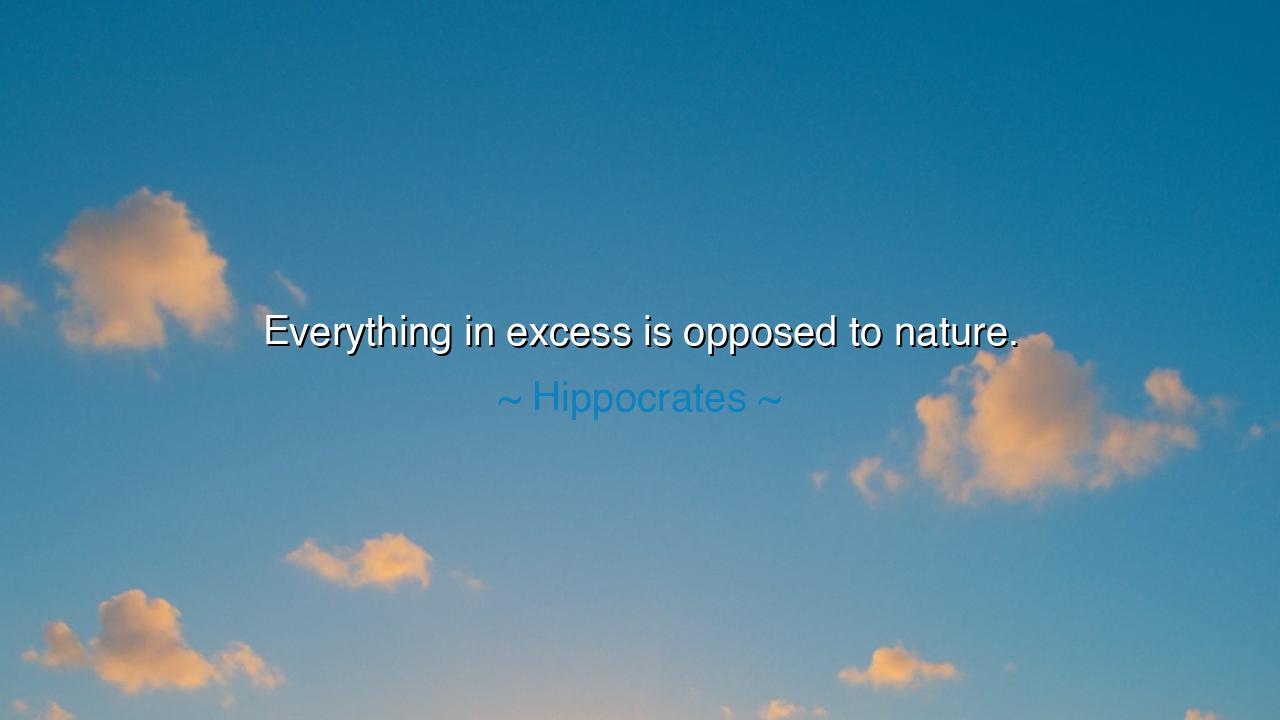
Everything in excess is opposed to nature.






Hear the ancient voice of Hippocrates, father of medicine, who proclaimed: “Everything in excess is opposed to nature.” These words are as timeless as the rising of the sun, for they speak not only of the body but of the soul, not only of health but of harmony itself. To live in balance is to live in accordance with the order of the cosmos; to live in excess is to war against the very laws that sustain life. Hippocrates, healer of men, saw this truth in every illness and every cure: where balance was broken, suffering followed; where balance was restored, life returned.
The ancients believed that nature is not chaos but order. The stars follow their paths, the seasons keep their turns, the river flows at its appointed pace. When man aligns himself with this rhythm, he flourishes. But when he seeks to seize more than is his portion—whether of food, of drink, of power, or of desire—he shatters the harmony, and the consequence is ruin. Excess blinds the eye, weakens the body, and enslaves the spirit. It is a rebellion against the eternal balance.
Consider the fall of Alexander the Great. He was a man of genius, of vision, of unstoppable energy. Yet when his thirst for conquest became excessive, it turned from glory to destruction. He pressed his men beyond endurance, demanded of the world more than it could give, and though he conquered empires, he could not conquer his own restless hunger. He died young, not in triumph but in weariness, a lesson written in fire across history’s scroll: greatness corrupted by excess cannot endure.
Hippocrates himself, in his healing arts, taught moderation as medicine. Too much food clogs the body, too little starves it. Too much rest weakens the limbs, too much labor breaks them. Even remedies, when taken in excess, become poison. The healer’s task, he said, was to restore balance—to bring the body back into accord with the laws of nature. In this teaching lies wisdom for all of life: the cure for many ills is not more, but enough.
The meaning is clear: man was not made for excess, but for balance. Desire is not evil, but unrestrained desire devours. Strength is not evil, but unchecked strength oppresses. Even joy, when sought in excess, turns into recklessness. The flame that gives light in measure becomes wildfire when unbounded. To live wisely is to know the boundary between sufficiency and excess, and to honor it.
The lesson is this: honor the measure of things. Eat to nourish, not to indulge. Speak to uplift, not to overwhelm. Work to serve, not to enslave yourself. Seek wealth, but not at the cost of your soul. Seek pleasure, but not to the ruin of your body. When balance is kept, peace follows; when excess reigns, suffering comes. For nature herself opposes the unmeasured, and none may triumph long against her.
What, then, are the practical actions? Begin each day by asking: “Where is my balance?” Practice temperance in food and drink. Set limits to your labor and your rest. Guard your speech, your ambition, your pleasures, that none overgrow and choke the garden of your life. Walk often in nature, for the trees, the rivers, the stars will remind you of proportion and harmony. And when you feel the pull of excess, remember Hippocrates’ warning: to go beyond the measure is to walk against the current of life itself.
So let us remember the wisdom of the healer: “Everything in excess is opposed to nature.” Live in measure, live in harmony, live in balance—and your days will be long, your body strong, your spirit untroubled. For the soul that honors balance walks hand in hand with the eternal order, and finds peace both in life and in death.






AAdministratorAdministrator
Welcome, honored guests. Please leave a comment, we will respond soon